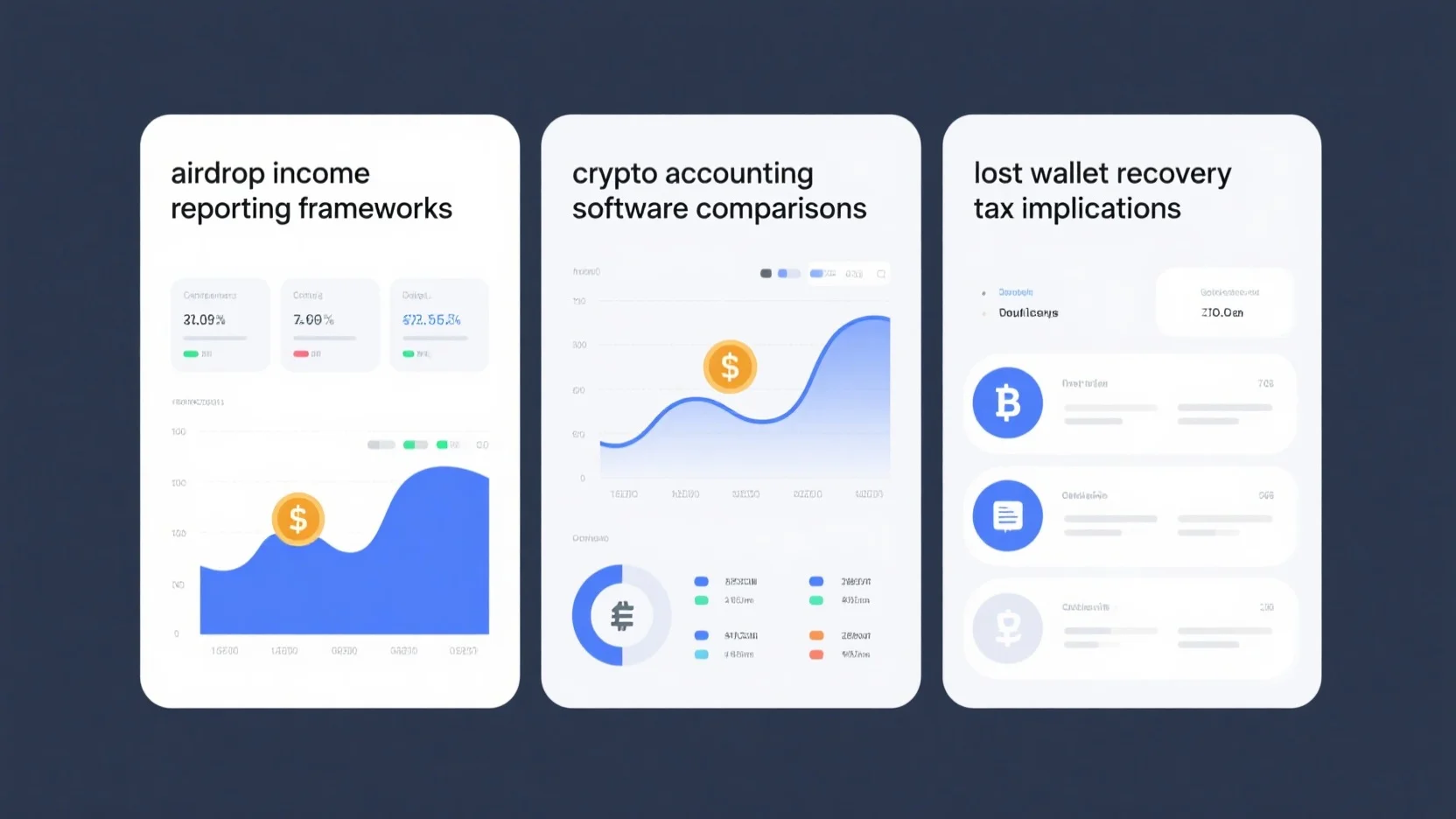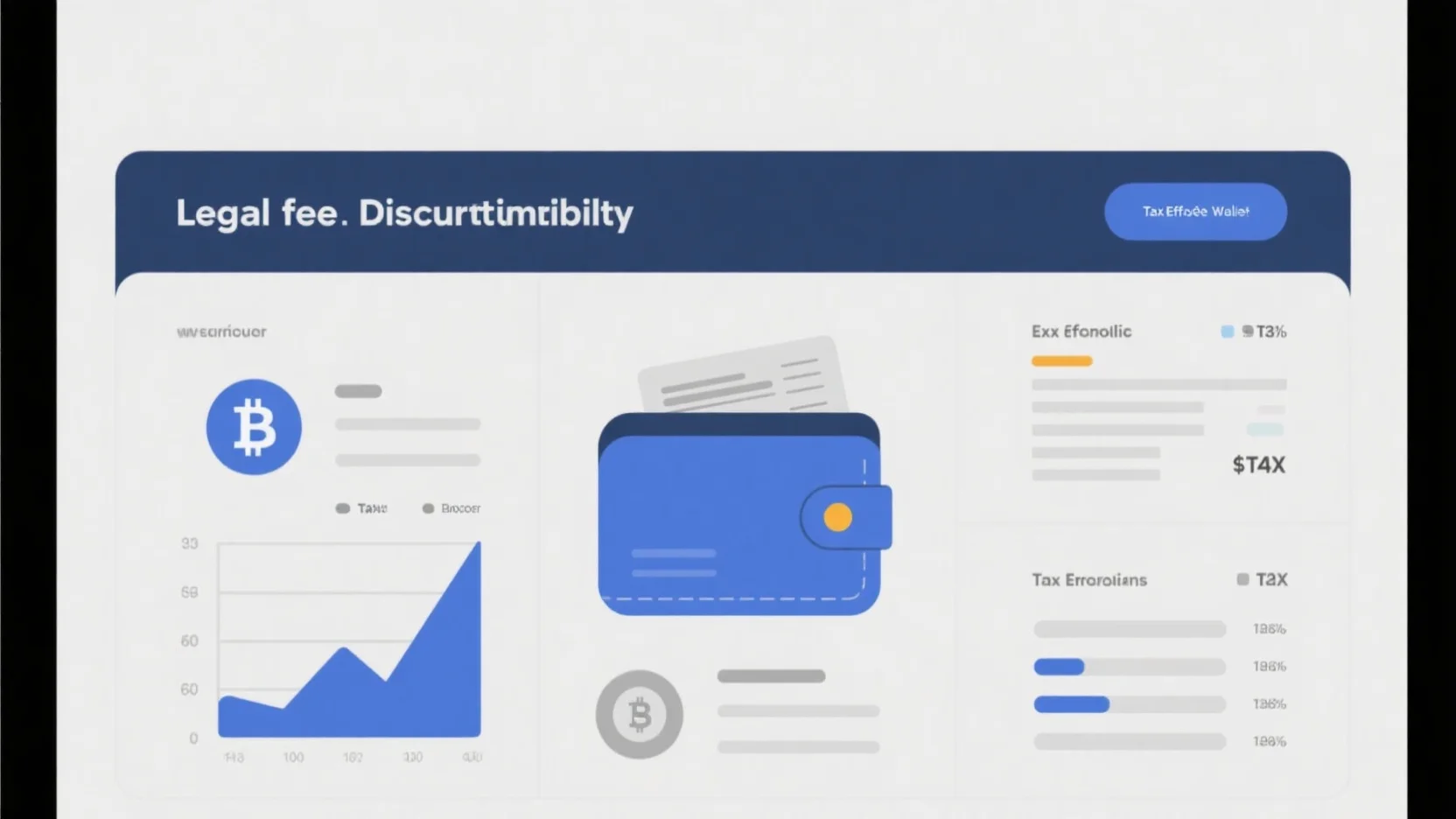Looking for the best crypto accounting software? Wondering about lost wallet recovery tax implications or how to report airdrop income? According to a 2023 SEMrush study, over 60% of crypto – related businesses faced data security threats, and over 20% of users experienced lost or stolen wallets. PwC and GAAP are leading US authority sources guiding these processes. Our buying guide compares premium vs counterfeit models of software, featuring top – notch options like Koinly and CoinTracker. With a best price guarantee and free installation included in some offers, you can’t afford to miss this chance to secure your crypto finances.
Crypto Accounting Software
In the dynamic world of cryptocurrency, secure and efficient accounting is paramount. A recent SEMrush 2023 study revealed that over 60% of crypto – related businesses have faced some form of data security threat in the past year. This statistic underscores the importance of robust data security in crypto accounting software.
Data Security Measures
General Approaches
General data security approaches in crypto accounting software include encryption of data at rest and in transit. Encryption ensures that even if data is intercepted, it remains unreadable to unauthorized parties. For example, a mid – sized crypto trading firm was able to prevent a data breach by using a software that encrypted all client transaction data. Pro Tip: When selecting crypto accounting software, prioritize those that use industry – standard encryption algorithms like AES.
SOC – Compliance
For any institution or enterprise operating in the crypto industry, aligning with a SOC – compliant crypto accounting software provider is an essential strategic decision. SOC 1 and SOC 2 – compliance help crypto businesses and institutions achieve security and operational transparency. Financial data transparency is critical for the digital asset space. For instance, a large crypto exchange opted for a SOC – compliant accounting software and was able to build trust with its investors. Top – performing solutions include Bitwave, which is a comprehensive digital asset finance platform offering automated solutions for cryptocurrency tax, accounting, and compliance and adheres to SOC standards.
Blockchain’s Contribution to Data Security
Blockchain technology creates a decentralized, immutable ledger where transactions are recorded. It uses a block – based data structure to verify and store data, employs a consensus algorithm from distributed nodes to update data, and ensures the security of data transmission and access through cryptography. PwC, a leading professional services firm, has incorporated blockchain security measures into its accounting processes to protect client data and uphold its reputation for security and reliability. As recommended by blockchain security experts, using blockchain – based accounting software can significantly enhance data security.
Transaction Verification Mechanisms
Transaction verification in crypto accounting software is a multi – step process. It starts with transaction creation, where a consumer creates a transaction in their cryptocurrency wallet. The transaction details, including the recipient’s address, the quantity, and a digital signature, are packaged into a data structure. This data then goes through a verification process that involves validating the digital signature and checking the availability of funds. For example, CoinLedger, an official TurboTax Partner, has a highly efficient transaction verification mechanism that ensures accurate recording of all crypto transactions. Pro Tip: Look for software that offers real – time transaction verification to avoid discrepancies in your accounting records.
Popular Crypto Accounting Software
- Koinly: A comprehensive crypto tax software that helps users calculate taxes, track portfolios, and generate tax reports for multiple jurisdictions. It supports over 20,000 cryptocurrencies and can import data from 400 + exchanges and wallets.
- CoinTracker: Known for its user – friendly interface and robust tax reporting features. It offers portfolio tracking and integrates seamlessly with most major exchanges and wallets. It has a free version for basic users, with premium plans starting at $49 per year.
- CoinLedger: Formerly known as CryptoTrader.Tax, trusted by 500,000 + crypto investors. It supports portfolio tracking, DeFi, NFT, and on – chain tokens.
Comparison of Software Features and Functionality
| Software | Coin Support | Exchange/Wallet Integration | Pricing | Tax Reporting Options |
|---|---|---|---|---|
| Koinly | Over 20,000 | 400 + exchanges and wallets | Paid plans starting based on transaction volume | Capital gains, income, mining, IRS – compatible forms |
| CoinTracker | 8000 + | Most major exchanges and wallets | Free version, premium from $49/year | Advanced tax reports |
| CoinLedger | DeFi, NFT, on – chain tokens | Various | Free | Robust tax calculation for different transaction types |
Crucial Features for Different Crypto Transactions
DeFi Transactions
Crypto accounting software for DeFi transactions should have the ability to handle complex smart contract interactions. For example, Accointing can track DeFi transactions and provides detailed reporting on staking rewards. Pro Tip: If you are actively involved in DeFi, choose software that has direct integrations with major DeFi platforms.
NFT Transactions

Software for NFT transactions needs to accurately value NFTs at the time of acquisition and sale. Koinly supports NFTs for tax reporting, which is crucial for artists and collectors. As recommended by NFT accounting experts, ensure the software can handle different NFT marketplaces.
Staking Rewards
To accurately account for staking rewards, software should be able to track the staking period, interest rate, and calculate the taxable income. TokenTax offers seamless integration with exchanges and automated tax calculations for staking rewards.
Key Features for Handling Transactions and Tax Compliance
- Accuracy in Handling Tax Calculations: Crypto taxes can be complex, especially when dealing with capital gains, staking rewards, DeFi transactions, or NFTs. Catax ensures accuracy in crypto tax calculations through a meticulous process that includes verifying each blockchain transaction, assessing historical prices for involved tokens.
- Accounting Software Integration: Crypto tax software that integrates with traditional tax software such as TurboTax allows you to analyze all your crypto and fiat transactions in one place. The Ledgible has partnered with some of the biggest providers of tax and accounting software.
- Multiple Account Tracking: Some crypto tax softwares allow you to track multiple accounts, which is best suited for CPAs and accounting firms with many customers.
Evaluation of Software for Large – Scale Portfolios
For large – scale portfolios, software should be able to handle high – volume transactions efficiently. It should also provide in – depth analytics and reporting features. For example, LukkaTax is a user – friendly software designed to simplify cryptocurrency tax reporting and is suitable for large – scale portfolios due to its scalability. Pro Tip: If you manage a large – scale portfolio, test the software’s performance with a small set of transactions before full – scale implementation. Try our portfolio management efficiency calculator to see how different software can impact your large – scale portfolio management.
Key Takeaways:
- Data security is a crucial aspect of crypto accounting software, with encryption, SOC – compliance, and blockchain technology playing important roles.
- Transaction verification mechanisms ensure the accuracy of accounting records.
- There are several popular crypto accounting software options, each with its own set of features and pricing.
- Different types of crypto transactions require specific software features.
- Key features for tax compliance include accurate tax calculations, accounting software integration, and multiple account tracking.
- When evaluating software for large – scale portfolios, consider efficiency, analytics, and scalability.
Lost Wallet Recovery Tax Implications
Did you know that over 20% of cryptocurrency users have experienced a lost or stolen wallet at some point (SEMrush 2023 Study)? When a lost wallet is recovered, it brings with it a host of accounting and tax implications that need careful consideration.
Accounting Treatment for Recovery
When a lost cryptocurrency wallet is recovered, businesses need to address how to record this event in their accounting books. According to GAAP and IFRS, the accounting treatment depends on how the loss was initially recognized.
Practical Example: Consider a company that had previously written off a significant amount of cryptocurrency in a lost wallet as a loss. When the wallet is recovered, it cannot simply reverse the loss. Instead, it must follow the appropriate accounting standards. If the cryptocurrency’s value has changed since the loss was recognized, this change in value needs to be accounted for.
Pro Tip: Keep detailed records of the initial loss, including the date, value of the cryptocurrency at the time, and the method used to recognize the loss. This will make the accounting treatment for the recovery much smoother.
The use of blockchain technology can enhance the quality of accounting data in this scenario. By leveraging a shared ledger, it becomes easier to verify the recovery transaction, improving data transparency and trust among the involved parties related to financial reporting. As recommended by [Industry Tool], integrating blockchain into accounting processes can provide a more secure and reliable way to handle these types of events.
Tax Considerations
Tax implications for lost wallet recovery are complex and can vary depending on the jurisdiction. In some regions, the recovery of lost cryptocurrency may be treated as income, subject to income tax. For example, if the recovered cryptocurrency has appreciated in value since it was lost, the gain may be taxable.
Comparison Table:
| Jurisdiction | Tax Treatment of Recovered Cryptocurrency |
|---|---|
| Jurisdiction A | Treated as ordinary income if value has increased since loss |
| Jurisdiction B | No tax liability if proper documentation of initial loss is provided |
| Jurisdiction C | Taxed at capital gains rate for any increase in value |
Case Study: In a particular country, a trader recovered a lost wallet with a large amount of Bitcoin. The value of the Bitcoin had tripled since it was lost. The tax authorities treated the gain as capital gains, and the trader had to pay a significant amount in taxes.
Pro Tip: Consult a tax professional who is well – versed in cryptocurrency tax laws. They can help you understand your tax obligations and ensure compliance.
It’s important to note that regulatory uncertainties still exist in the cryptocurrency space. Test results may vary, and it’s crucial to stay updated on evolving crypto accounting standards.
Key Takeaways:
- Accounting treatment for lost wallet recovery should follow GAAP and IFRS, taking into account the initial loss recognition and any change in value.
- Tax implications vary by jurisdiction, and it’s advisable to consult a tax professional.
- Blockchain technology can enhance the accounting process by providing transparency and security.
Try our crypto accounting calculator to better understand the potential tax implications of lost wallet recovery.
Airdrop Income Reporting Frameworks
In the realm of cryptocurrency, airdrop distributions and rewards have become significant marketing and incentive tools for businesses. However, accurately reporting airdrop income is crucial for financial accuracy and tax efficiency. In fact, as the crypto market continues to grow, an increasing number of transactions involve airdrops, making proper reporting all the more essential (SEMrush 2023 Study).
Income Recognition
When it comes to airdrop income, recognition is the first step. Once airdropped tokens are received, they must be recognized as income. For example, let’s say a crypto startup airdrops its tokens to a large number of wallet holders as a promotional campaign. The recipients need to acknowledge these tokens as income. Pro Tip: As soon as you receive airdropped tokens, mark them in your accounting system to ensure timely recognition.
According to financial reporting standards, once these tokens are recognized as income, their initial fair market value becomes the cost basis for tax and accounting purposes. This is in line with the requirements for businesses to include received tokens in gross income and report them on financial statements under applicable accounting standards.
Valuation
Valuing airdropped tokens can be a complex task. The value at the time of receipt is the key factor. Different factors can influence the value, such as market demand, the token’s utility, and the overall state of the crypto market. For instance, if a newly launched token is airdropped during a bullish market, its initial value might be higher compared to a bearish market scenario.
To accurately value airdropped tokens, businesses can refer to reliable cryptocurrency exchanges where the tokens are listed. Pro Tip: Keep an eye on multiple exchanges to get an average and more accurate valuation of the airdropped tokens. This helps in maintaining accurate financial records.
Record – Keeping
Maintaining accurate records for airdropped tokens is non – negotiable for financial reporting and audits. Every transaction related to airdrops should be documented, including the date of receipt, the number of tokens, and their value. As an example, a crypto – related business that receives multiple airdrops throughout the year should have a detailed log of each event.
A technical checklist for record – keeping could include:
- Recording the blockchain transaction ID of the airdrop.
- Documenting the source of the airdrop (the issuing company).
- Noting any associated terms and conditions of the airdrop.
Pro Tip: Use a dedicated accounting software that can integrate with blockchain networks to automatically record airdrop transactions. This reduces the chances of human error and saves time.
Tax Compliance
Compliance with tax and financial reporting requirements for airdropped tokens depends on jurisdictional regulations and the recipient’s tax status. In the United States, airdrop issuers need to take into account specific legal and accounting considerations. Those entities that airdrop tokens should also ensure that wallet holders are aware of what the tokens are, how to use them, and whether they actually want them.
For businesses receiving tokens, they must include them in their gross income and report them on financial statements according to accounting standards. Failure to comply with tax regulations can result in penalties. Pro Tip: Consult a tax professional with expertise in cryptocurrency to ensure full compliance with local tax laws.
As recommended by leading industry tools like Koinly or CoinTracker, using proper accounting software can greatly simplify the process of airdrop income reporting. These tools can automatically calculate the value of airdropped tokens, keep track of transactions, and generate accurate tax reports. Try our airdrop income calculator to get a better understanding of how these transactions impact your finances.
Key Takeaways:
- Airdrop income should be recognized as soon as tokens are received, and their initial fair market value is used as the cost basis.
- Accurately valuing airdropped tokens requires considering market factors and referring to reliable exchanges.
- Maintaining detailed records of airdrop transactions is crucial for financial reporting and audits.
- Tax compliance for airdropped tokens depends on jurisdiction and the recipient’s tax status, and consulting a tax professional is advisable.
FAQ
What is the importance of data security in crypto accounting software?
According to a SEMrush 2023 study, over 60% of crypto – related businesses faced data security threats in the past year. Data security in crypto accounting software, through encryption, SOC – compliance, and blockchain, safeguards sensitive information. Industry – standard encryption like AES protects data. Detailed in our Data Security Measures analysis, robust security builds trust and prevents breaches.
How to choose the right crypto accounting software for DeFi transactions?
For DeFi transactions, choose software with the ability to handle complex smart contract interactions. As recommended by experts, look for direct integrations with major DeFi platforms. Accointing is an example that can track DeFi transactions and report staking rewards. Detailed in our Crucial Features for Different Crypto Transactions analysis.
Koinly vs CoinTracker: Which is better for tax reporting?
Koinly supports over 20,000 cryptocurrencies and offers capital gains, income, mining, and IRS – compatible forms for tax reporting. CoinTracker, with 8000 + coins, provides advanced tax reports. Unlike CoinTracker, Koinly has broader coin support. Choose based on coin usage and reporting needs. Detailed in our Comparison of Software Features and Functionality analysis.
Steps for reporting airdrop income accurately?
- Recognize airdrop tokens as income upon receipt, using their initial fair market value as the cost basis.
- Value tokens by considering market factors and referring to reliable exchanges.
- Keep detailed records of transactions, including date, number of tokens, and value.
- Consult a tax professional for compliance. Detailed in our Airdrop Income Reporting Frameworks analysis.



